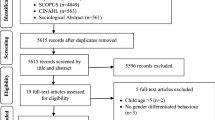Abstract
This paper discusses Merleau-Ponty’s use of idea of ambivalence and its role in psychological conflicts. Merleau-Ponty affirms ambivalent conflicts as lived and social rather than biologically determined, as one might have in some developmental accounts, or hidden, as in some psychoanalytic accounts. With this concept, the paper takes up feminist considerations of the conflicts experienced by mothers in breastfeeding. It argues that the Merleau-Pontian and feminist approach to considering breastfeeding provides a nuanced model for thinking about development that is better suited to cases where both the child and the parent are co-evolving.
Similar content being viewed by others
References
Beauvoir, S. (2009). The Second Sex. Translated by Constance Borde & Sheila Malovany-Chevallier. New York: Knopf.
Butler, J. (2007). Performative acts and gender constitution: An essay in phenomenology and feminist theory. The Feminist Philosophy Reader. Eds. Alison Bailey & Chris Cuomo, 97-107. New York: McGraw-hill.
Colen, G., & Ramey, D. (2014). Is breast truly best? Estimating the effects of breastfeeding on long-term child health and wellbeing in the United States using sibling comparisons. Social Science & Medicine, 109, 55–65.
Deutsch, H. (1944–45). The Psychology of Women: A Psychoanalytic Interpretation. New York: Grune and Stratton.
Freud, S. (1930). Civilization and its discontents. In The Standard Edition of the Complete Psychological Works of Sigmund Freud Vol. 21, ed. James Strachey, 59–145. London: Hogarth Press and the Institute of Psycho-Analysis, 1953a.
Freud, S. (1927). The future of an illusion. In The Standard Edition of the Complete Psychological Works of Sigmund Freud Vol. 21, ed. James Strachey, 5–56. London: Hogarth Press and the Institute of Psycho-Analysis, 1953b.
Freud, S. (1905). Three essays on the theory of sexuality. In The Standard Edition of the Complete Psychological Works of Sigmund Freud Vol. 7, ed. James Strachey, 125–245. London: Hogarth Press and the Institute of Psycho-Analysis, 1953c.
Freud, S. (1913). Totem and taboo. In The Standard Edition of the Complete Psychological Works of Sigmund Freud Vol. 13, ed. James Strachey, 1–162. London: Hogarth Press and the Institute of Psycho-Analysise, 1953d.
Hausman, B. (2003). Mother’s milk: Breastfeeding controversies in American culture. New York: Routledge.
Horta, B., Bahl, R., Martines, J., & Cesar, V. (2007). Evidence on the long-term effects of breastfeeding: Systematic reviews and meta-analysis. World Health Organization. http://www.who.int/maternal_child_adolescent/documents/9241595230/en/.
Kardiner, A. (1974). The individual and his society. Westport: Greenwood.
Kukla, R. (2006). Ethics and ideology in breastfeeding advocacy campaigns. Hypatia, 21(1), 157–180.
LaChance Adams, S. (2014). Mad mothers, bad mothers, & what a ‘Good’ mother would do: The ethics of ambivalence. New York: Columbia University Press.
Labbok, M. (2008). Exploration of guilt among mothers who do not breastfeed: The physician’s role. Journal of Human Lactation, 24(1), 80–84.
Marshall, J. L., Godfrey, M., & Renfrew, M. (2007). Being a ‘good mother’: Managing breastfeeding and merging identities. Social Science & Medicine, 65, 2147–2159.
Merleau-Ponty, M. (2010). Child psychology and pedagogy: The Sorbonne lectures 1949–1952. Trans. Talia Welsh. Evanston: Northwestern University Press.
Merleau-Ponty, M. (2012). Phenomenology of Perception. Translated by Donald Landes. New York: Routledge.
Politzer, G. (1968). Critique des fondements de la psychologie: La psychologie et la psychoanalyse. Paris: PUF.
Sartre, J.P. (1956). Being and nothingness. Translated by H. E. Barnes. New York: Philosophical Library.
Taylor, E. N., & Wallace, L. E. (2012). For shame: Feminism, breastfeeding advocacy, and maternal guilt. Hypatia, 27(1), 76–97.
Author information
Authors and Affiliations
Corresponding author
Rights and permissions
About this article
Cite this article
Welsh, T. The adult-child relationship in breastfeeding and development: a Merleau-Pontian perspective on the existential and social conflicts in childrearing. Phenom Cogn Sci 16, 649–659 (2017). https://doi.org/10.1007/s11097-017-9518-y
Published:
Issue Date:
DOI: https://doi.org/10.1007/s11097-017-9518-y




